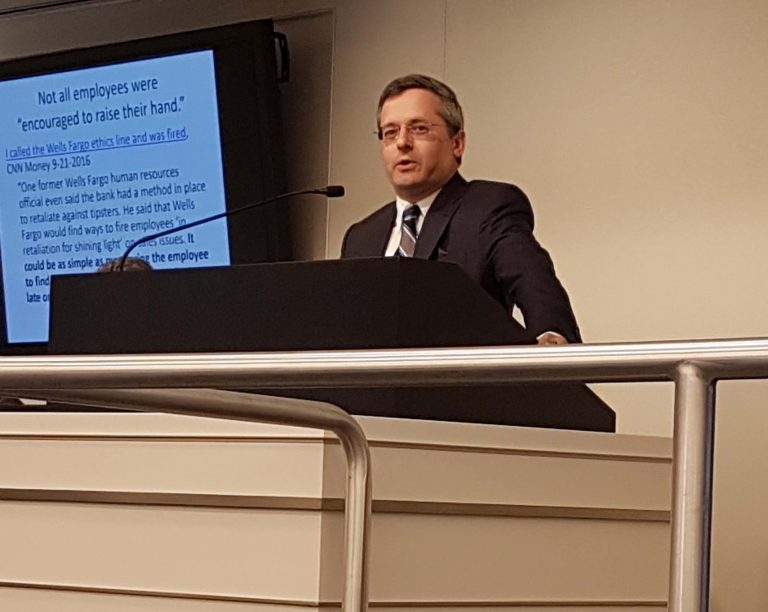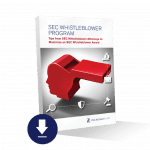On June 28, 2017, Jason Zuckerman of Zuckerman Law spoke on a panel at the Practicing Law Institute’s Corporate Whistleblowing seminar alongside Renee Phillips, Co-Chair of Orrick’s Whistleblower Task Force, Jane Norberg, the head of the SEC’s Whistleblower Office, Christopher Ehrman, the head of the CFTC’s Whistleblower Office, and Teri Wigger, the assistant regional administrator in the Whistleblower Protections Program of the U.S. Department of Labor’s Occupational Safety and Health Administration (OSHA). The panel discussed recent developments in the whistleblower landscape.
SEC Whistleblower Program
The chief of the SEC’s Whistleblower Office described SEC Whistleblower Program as “business as usual,” and did not anticipate any major changes in the SEC’s Whistleblower Reward Program. “From my point of view, the SEC’s whistleblower program is open for business and we are moving forward as we have in the past,” said Norberg. She also underscored the early success of the program. Since 2011, the SEC Whistleblower Office has:
- Received over 18,000 tips from whistleblowers;
- Issued more than $154 million in awards to 44 whistleblowers; and
- Enabled the SEC to recover nearly $1 billion in financial remedies from wrongdoers.
Norberg noted that the SEC Whistleblower Program has assisted the SEC to halt ongoing fraud, thereby protecting investors. She also affirmed the office’s commitment to protecting whistleblowers from retaliation and reducing hurdles that whistleblowers encounter when disclosing fraud to the SEC. The SEC has brought 9 enforcement actions against companies for retaliating against whistleblowers or including gag clauses in agreements that could dissuade or impede current or former employees from disclosing fraud to the SEC.
CFTC Whistleblower Program
The director of the CFTC’s Whistleblower Office stated the agency is currently trying to promote the CFTC Whistleblower Program. While the program has enjoyed less success than the SEC Whistleblower Office, Ehrman noted that the CFTC’s Whistleblower Office is hiring additional staff and is “confident that this is going to be a very strong year for the Commission and our program in particular.”
Ehrman also emphasized that the new amendments to the CFTC’s whistleblower program, which strengthened whistleblower’s protection against retaliation and enhanced the whistleblower program, should improve the program. To date, the CFTC has issued nearly $12 million in awards to whistleblowers. The largest award is $10 million.
OSHA Whistleblower Protection Program
The assistant regional administrator of OSHA’s Whistleblower Protections Program spoke about an increase in the agency’s caseload, including Sarbanes-Oxley (SOX) whistleblower retaliation and Consumer Financial Protection Act (CFPA) retaliation cases. Recently, OSHA ordered Wells Fargo to pay $5.4 million to a whistleblower in a SOX retaliation case. This was the largest OSHA award in a SOX case.
Ms. Wigger also noted that OSHA Region II has made progress addressing a large backload of whistleblower retaliation cases, and that the average duration for an investigation is that region is now about one year. In addition, Ms. Wigger observed that not many SOX complainants remove their claims from OSHA to district court 180 days after filing (an option under Section 806 of SOX).
Update on Recent Developments in Whistleblower Law
Zuckerman discussed recent developments in whistleblower law, including:
- A key decision in a whistleblower case recognizing a public policy exception in SOX and Dodd-Frank permitting whistleblowers to use confidential company documents to report fraud to the SEC.
- Recent jury verdicts in SOX whistleblower cases, including $11 million for an in-house attorney who was fired shortly after reporting potential violations of the Foreign Corrupt Practices Act; and $5 million for a chemist who was fired after reporting potential shareholder fraud concerning public representations about the results of a clinical trial.
- DOL and appellate decisions broadly the scope of retaliatory adverse actions under SOX, including the Fifth Circuit’s decision in Halliburton, Inc. v. Admin. Review Bd. holding that “outing” a whistleblower is a prohibited adverse action.
- Federal court decisions construing the scope of protected whistleblowing under SOX, including the recent decision in Murray v. UBS Securities, LLC holding that disclosures of potential securities law violations are protected under SOX.
- The Department of Labor Administrative Review Board’s ruling in Palmer v. Canadian National Railway clarifying the burden-shifting framework under the FRSA, SOX and other whistleblower protection laws adjudicated at the DOL.
The panelists agreed that there will likely a lot of further developments under whistleblower rewards and whistleblower protection laws in the coming years.
The course materials are available for purchase at PLI’s website.
To learn more about the SEC whistleblower rewards program, download Zuckerman Law’s free ebook:
whistleblower_lawyers_012017_infographic









